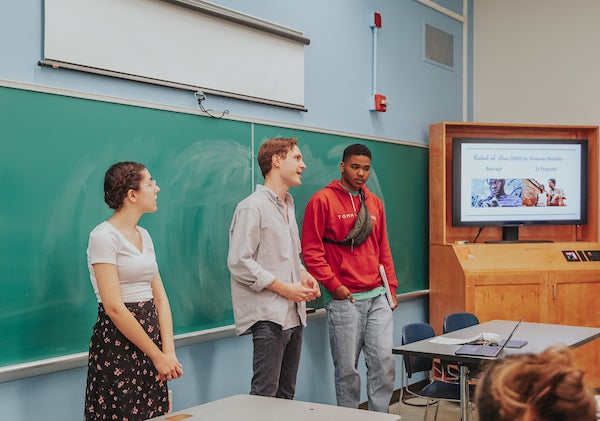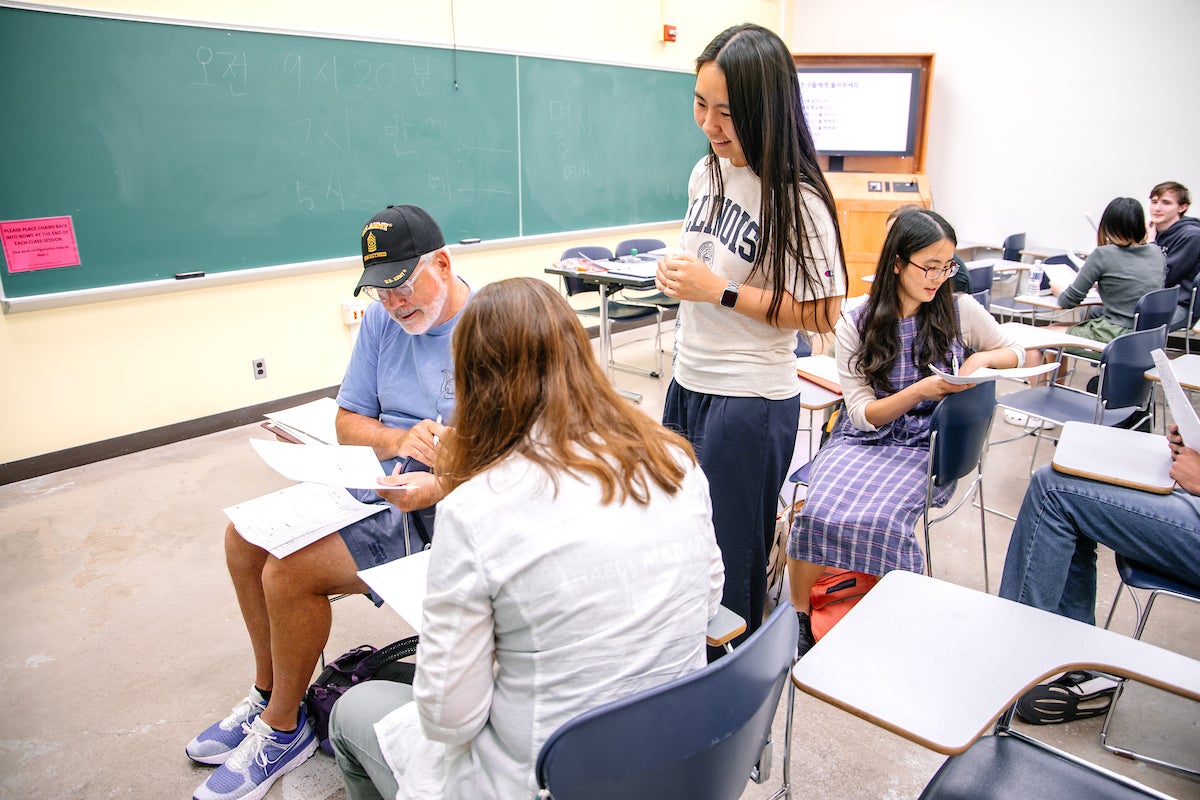What do lawyers, accountants, teachers, and doctors all have in common?
 These are all professions that require critical thinking skills. Why are critical thinking skills important? The importance of critical thinking can be found across a wide set of disciplines. They are not only used in the humanities but are also important to professionals in the social and behavioral sciences, physical sciences, and STEM—and the list does not end there. At the University of Illinois College of Liberal Arts & Sciences, you’ll be able to take classes and even choose a major in these diverse fields. No matter your professional goals, the kind of critical thinking you’ll learn as a student in the College of LAS will get you there! Read on to learn more about the benefits of critical thinking and how it can impact your success as a student, and eventually as a professional.
These are all professions that require critical thinking skills. Why are critical thinking skills important? The importance of critical thinking can be found across a wide set of disciplines. They are not only used in the humanities but are also important to professionals in the social and behavioral sciences, physical sciences, and STEM—and the list does not end there. At the University of Illinois College of Liberal Arts & Sciences, you’ll be able to take classes and even choose a major in these diverse fields. No matter your professional goals, the kind of critical thinking you’ll learn as a student in the College of LAS will get you there! Read on to learn more about the benefits of critical thinking and how it can impact your success as a student, and eventually as a professional.
What is critical thinking? What is the goal of critical thinking?
Critical Thinking involves analyzing and evaluating reasons to assess statements, assumptions, and arguments in everyday situations. The goal is to develop well-founded beliefs that align with key thought objectives, such as truth, practicality, or rationality.
We use critical thinking every day, from decision-making to problem-solving, in addition to thinking critically in an academic context!

Why is critical thinking important for academic success?
You may be asking “why is critical thinking important for students?” Critical thinking appears in a diverse set of disciplines and impacts students’ learning every day, regardless of major.
Critical thinking skills are often associated with the value of studying the humanities. In majors such as English, students will be presented with a certain text—whether it’s a novel, short story, essay, or even film—and will have to use textual evidence to make an argument and then defend their argument about what they’ve read. However, the importance of critical thinking does not only apply to the humanities. In the social sciences, an economics major, for example, will use what they’ve learned to figure out solutions to issues as varied as land and other natural resource use, to how much people should work, to how to develop human capital through education. Problem-solving and critical thinking go hand in hand. Biology is a popular major within LAS, and graduates of the biology program often pursue careers in the medical sciences. Doctors use critical thinking every day, tapping into the knowledge they acquired from studying the biological sciences to diagnose and treat different diseases and ailments.
Students in the College of LAS take many courses that require critical thinking before they graduate. You may be asked in an Economics class to use statistical data analysis to evaluate the impact on home improvement spending when the Fed increases interest rates (read more about real-world experience with Datathon). If you’ve ever been asked “How often do you think about the Roman Empire?”, you may find yourself thinking about the Roman Empire more than you thought—maybe in an English course, where you’ll use text from Shakespeare’s Antony and Cleopatra to make an argument about Roman imperial desire. No matter what the context is, critical thinking will be involved in your academic life and can take form in many different ways.
The benefits of critical thinking in everyday life
Building better communication
One of the most important life skills that students learn as early as elementary school is how to give a presentation. Many classes require students to give presentations, because being well-spoken is a key skill in effective communication. This is where critical thinking benefits come into play: using the skills you’ve learned, you’ll be able to gather the information needed for your presentation, narrow down what information is most relevant, and communicate it in an engaging way.
Typically, the first step in creating a presentation is choosing a topic. For example, your professor might assign a presentation on the Gilded Age and provide a list of figures from the 1870s—1890s to choose from. You’ll use your critical thinking skills to narrow down your choices. You may ask yourself:
- What figure am I most familiar with?
- Who am I most interested in?
- Will I have to do additional research?
After choosing your topic, your professor will usually ask a guiding question to help you form a thesis: an argument that is backed up with evidence. Critical thinking benefits this process by allowing you to focus on the information that is most relevant in support of your argument. By focusing on the strongest evidence, you will communicate your thesis clearly.
Finally, once you’ve finished gathering information, you will begin putting your presentation together. Creating a presentation requires a balance of text and visuals. Graphs and tables are popular visuals in STEM-based projects, but digital images and graphics are effective as well. Critical thinking benefits this process because the right images and visuals create a more dynamic experience for the audience, giving them the opportunity to engage with the material.
Presentation skills go beyond the classroom. Students at the University of Illinois will often participate in summer internships to get professional experience before graduation. Many summer interns are required to present about their experience and what they learned at the end of the internship. Jobs frequently also require employees to create presentations of some kind—whether it’s an advertising pitch to win an account from a potential client, or quarterly reporting, giving a presentation is a life skill that directly relates to critical thinking.
Fostering independence and confidence
Budgeting
An important life skill many people start learning as college students and then finessing once they enter the “adult world” is how to budget. There will be many different expenses to keep track of, including rent, bills, car payments, and groceries, just to name a few! After developing your critical thinking skills, you’ll put them to use to consider your salary and budget your expenses accordingly. Here’s an example:
- You earn a salary of $75,000 a year. Assume all amounts are before taxes.
- You pay $1,800 a month for rent
- 1,800 x 12 = 21,600
- 75,000 – 21,600 = 53,400
- This leaves you with $53,400
- You spend $320 a month on groceries
- 320 x 12 = 3,840 a year
- 53,400-3,840= 49,560
- You have a monthly car payment of $726
- 726 x 12 = 8,712
- 49,560 – 8,712= 40,848
- You’re left with $40,848 for miscellaneous expenses. You use your critical thinking skills to decide what to do with your $40,848. You think ahead towards your retirement and decide to put $500 a month into a Roth IRA, leaving $34,848. Since you love coffee, you try to figure out if you can afford a daily coffee run. On average, a cup of coffee will cost you $7. 7 x 365 = $2,555 a year for coffee. 34,848 – 2,555 = 32,293
- You have $32,293 left. You will use your critical thinking skills to figure out how much you would want to put into savings, how much you want to save to treat yourself from time to time, and how much you want to put aside for emergency funds. With the benefits of critical thinking, you will be well-equipped to budget your lifestyle once you enter the working world.
Enhancing decision-making skills
Choosing the right university for you
One of the biggest decisions you’ll make in your life is what college or university to go to. There are many factors to consider when making this decision, and critical thinking importance will come into play when determining these factors.
Many high school seniors apply to colleges with the hope of being accepted into a certain program, whether it’s biology, psychology, political science, English, or something else entirely. Some students apply with certain schools in mind due to overall rankings. Students also consider the campus a school is set in. While some universities such as the University of Illinois are nestled within college towns, New York University is right in Manhattan, in a big city setting. Some students dream of going to large universities, and other students prefer smaller schools. The diversity of a university’s student body is also a key consideration. For many 17- and 18-year-olds, college is a time to meet peers from diverse racial and socio-economic backgrounds and learn about life experiences different than one’s own.
With all these factors in mind, you’ll use critical thinking to decide which are most important to you—and which school is the right fit for you.
Develop your critical thinking skills at the University of Illinois
At the University of Illinois, not only will you learn how to think critically, but you will put critical thinking into practice. In the College of LAS, you can choose from 70+ majors where you will learn the importance and benefits of critical thinking skills. The College of Liberal Arts & Sciences at U of I offers a wide range of undergraduate and graduate programs in life, physical, and mathematical sciences; humanities; and social and behavioral sciences. No matter which program you choose, you will develop critical thinking skills as you go through your courses in the major of your choice. And in those courses, the first question your professors may ask you is, “What is the goal of critical thinking?” You will be able to respond with confidence that the goal of critical thinking is to help shape people into more informed, more thoughtful members of society.
With such a vast representation of disciplines, an education in the College of LAS will prepare you for a career where you will apply critical thinking skills to real life, both in and outside of the classroom, from your undergraduate experience to your professional career. If you’re interested in becoming a part of a diverse set of students and developing skills for lifelong success, apply to LAS today!